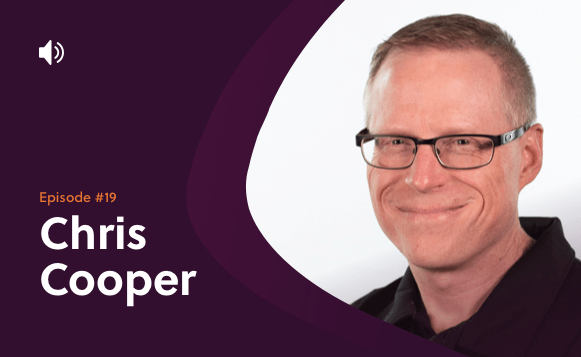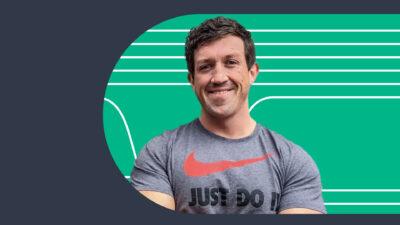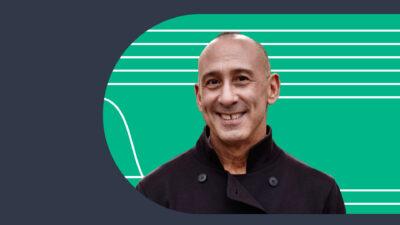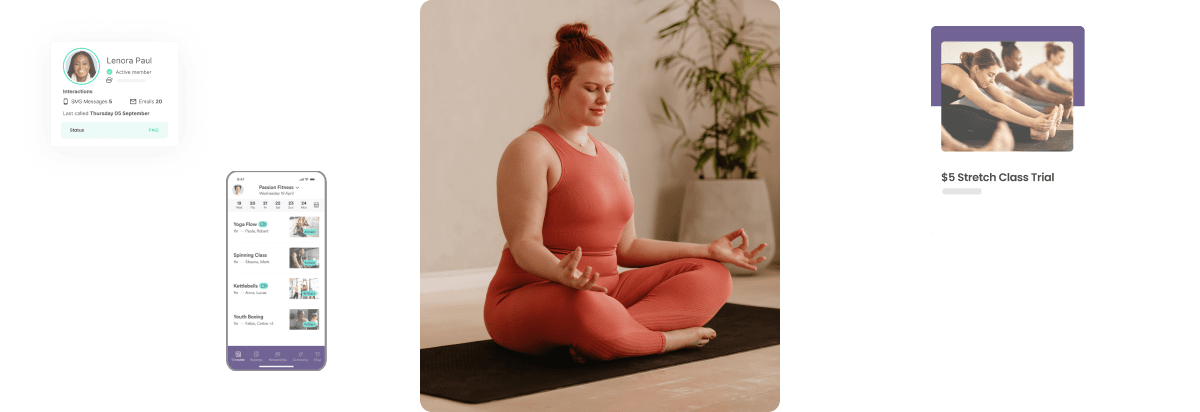Chris Cooper is a gym owner and the author of the best-selling fitness business books Two-Brain Business and Two Brain Business 2.0. He is also the founder of the business mentorship program of the same name, which you can find at www.twobrain.com.
Chris talks about how the concept of the Gym Business Flywheel can make gyms profitable. This is essential listening for anyone looking to grow their gym.
Transcript
Kevin:How is it going everyone? Welcome to the Fitness Founders Podcast. I’m Kevin Mannion, VP Marketing here at Glofox. This week we talk to Chris Cooper, author, and the founder of Two-Brain Business, a gym membership program focus on creating a million successful fitness entrepreneurs. In this episode, Chris talks about his methods for creating profitable gym businesses while minimizing the stressed involved. It sounds promising so let’s have a listen.
Okay, Chris Copper, welcome to the show.
Chris:Thanks very much, Kevin. Really happy to be here.
Kevin:Great. Great to have you here. So Chris, you are all the way from somewhere in Ontario, Canada. Would you tell us a little bit about yourself.
Chris:Yeah, somewhere in Sault Ste Marie which is a depressed steel town. All the major industries have gone bankrupt since I opened my gym. We are still thriving, so a lot of that is due to the membership that I received when my gym first ran into trouble in 2008. And we were two locations back then, I just found cross fit, so we opened up a second location and the first location was like a personal training studio, second was this cross fit gym. And the personal training studio made all the money but I was in love with coaching groups and kind of like this hard core, industrial park out of the way thing. The problem was that it wasn’t working and I was almost bankrupt. I was fighting with my wife over buying the expensive cheese at the grocery store, and I found myself sitting on this part of the bench going, “Where I’m going wrong here”, and finally realizing I’m not just going to figure it out. And so I found some help from a local mentor. I got into an amazing program. I wrote him a check for $500 that should have bounced and I don’t know how it didn’t because I thought he was going to give me this amazing marketing secret, and that’s not what happened. So what I did was I started justifying the customize help by saying I’m going to publish this online for free, like I’m going to give away all those guy’s secrets, in that way I’ll remember his lessons better but also any other gym owner that’s struggling can get this for free, and that was a blog called dontbuyads.com. I posted almost 400 blogposts on there before I was invited to speak at a gym in Fort Lauderdale and when I was just about to fly there I realized that the other two speakers were way ahead of me or so I thought and that they had these amazing resources to hand out. And so I was thinking like what could I print off, pack in a suitcase, travel across international border with a handout. It just turned out that it was easier to put things into a book, self-publish and ship to the location. And so I publish Two-Brain Business over the course of a weekend. I drew the cover myself. There were no page numbers, there’s no table of contents, and it’s the best-selling fitness business book of all time.
Kevin:Awesome. That’s quite a story. So Two-Brain business is your current business now and obviously you’ve built it in parallel with running your own gyms and learning hard lessons probably along the way there so maybe tell me, what is two brain business today?
Chris:We are a mentorship practice for gym owners. After I published the first book, I started getting people calling and saying can we get an hour call. And for over a year I just did this for free and then I started to realize like just as in the gym if somebody is paying for the service they are more likely to take action and get results. And so I started doing some membership around early 2012, learning what worked, and early 2016 I founded twobrainbusiness.com because I realized I’m full. Like I can’t achieve my mission of making a million fitness entrepreneurs wealthy by myself and so we needed a replicable system just like in my gym where I could certify mentors in the Two-Brain process and then they could deliver that to other people with the same effect and beautiful thing that’s happened there is that everybody on a team is better than me either at relating to other gym owners or at a particular specialty like sales or marketing or whatever. So we just keep kind of ramping up that way and, you know, I know we are going to talk about the flywheel effect of that but it happens in Two-Brain not just in gyms.
Kevin:Okay, that sounds like a pretty interesting business. So to jump I suppose quickly and then to the topic of today, and which I think the methodology that you’ve developed for making gyms more profitable with less stress and you call it the ‘Flywheel’. So maybe, let’s actually just dive into that and create a little bit of an overview of that and also maybe some quick lessons learned for some of the people listening on the podcast.
Chris:Sure. The ‘Flywheel’ concept actually comes from Jim Collins in his book Good to Great. And Jim is a personal hero of mine, we’re trying to figure out a way that I can go visit him in September in Boulder at his management lab. But what we’ve found is that being where we are in the industry we have access to all kinds of data that nobody is really looking at, or tracking, or sifting through, right. And we are a million ideas in the fitness industry and almost all of them work at some point and then stop working. Or maybe they are bad idea, or maybe they are an amazing idea but we really need is a filter. And so when we started build resources that allow us to filter this data what we found was that there are really six areas that a gym owner can focus on to build their business.
Kevin:Okay.
Chris:So the ‘Flywheel’ concept is basically like imagine that you are pushing this 30,000 pound steel flywheel, and at first no matter how strong you are it takes a ton of work to get this moving even an inch. But once it’s moving, if you expel the same effort again you are going to move it a little bit more, and then a little bit more, and then faster, and faster. And soon this thing is kind of turning on its own and you are still applying pressure but it is going faster and faster. And this is like your business, at first it takes a ton of effort to get anything from it but then once it’s moving that same effort will make your business grow a bit and then soon you start to put these systems in place. What we found though after doing about 2,000 1-hour free calls with gym owners is that most gym owners have a flat tire. So instead of a nice round flywheel something missing. So maybe they’ve got amazing coaches, great. Maybe they are getting good referrals, awesome. But then when it comes to getting new leads in the door they have no process, they don’t know what to do. They don’t know how to do any kind of ads or whatever so the flywheel is flat. So the owner is working really, really hard to push that flat wheel. Now, if you look at this flywheel from the side you’ll see that there are basically six areas where you can either have a handle or you can have a flat. You either missing a system or you have a system you could apply pressure.
So the six flywheels are, number one, teaching the vision which is explaining why you are doing this through media production to both your clients and your staff, and people who aren’t your clients yet. The second thing is improve operational excellence so the reason that people come to gyms is they are attracted to the idea. The reason people leave gyms is because they are unfulfilled. You are not offering an excellent service. Maybe you care a lot, maybe you know a lot, but your delivery sticks and you can do better. The third handle is upgrading your team, so it is amazing to have smart, caring, knowledgeable people, but you do have to have people who are smart, and caring, and knowledgeable doing excellent work and you have to teach them how to do that. The fourth is keeping clients longer. When we went through our data one of the things that stood out the most in 2019 was that the average gym owner could make an extra $40,000 a year if they just kept the average client for three more months. That’s incredible. The fifth handle is sell more so you have to be better at understanding how to upgrade your clients, what they should be paying and how you can serve them better. And then the sixth is get more leads. You know, you have to be able to talk to people who are strangers, who aren’t your clients yet.
Kevin:Okay that make sense and what we’ll do now maybe is dive into each one a little deeper. But before we do that I think a lot of people who maybe write books for fitness businesses really dive into one of these areas, you know, so it’s all about retention, or it’s all about sales, or it’s all about getting the right package. Why have you gone for something more holistic?
Chris:Well, because if any one of these things is missing you are screwed so our mission is to get a million fitness entrepreneurs to wealth because that is a very highly leverageable mission, right. If we want to change the health of the world, the best way to do that is to empower a million people who are smart and caring and know how to do that. So the problem is that like these people are used to grinding. At the beginning they are fine with teaching a class at 5am, and a class at 9pm same day. The problem is that’s not sustainable and a lot of gym owners are in it for three years and then are gone, and that doesn’t serve the mission. So if you are really, really good at one thing on a flywheel that’s great but as soon as you hit one of these areas and you are weak there you got to work five times as hard. That’s what leads to burn out.
Kevin:Okay, so it’s just too much even if you excel and wanted to do these things it is just too much energy if you are flat on one or two more and you’re eventually going to burn.
Chris:I’ll give you an example. So Facebook ads are incredibly sexy and very appealing to gym owners, right, and they work. So what happens is a lot of gym owners will sign up for a system that’s going to get them Facebook leads, so maybe that’s an ad agency, maybe it’s like a plan that they buy online, whatever. And so they start getting a bunch of leads and they start making more money, you know, the flywheel starts turning. But then you hit that keep clients longer handle, the retention piece, and they just stop. And what happens is the new clients come in, they stay for 4 or 6 weeks, or whatever it is and then they are gone, and then you got to start all over again. But the second time your marketing ad spend goes up.
Kevin:Yeah, extend them more.
Chris:Yeah, the quality of the client goes down. And by the way your current clients are wondering why you are spending all your time with these new clients so they start leaving and your coaches start getting burnt out. So when you’ve got that flat, you know, it requires more work from everybody and the entrepreneur will be the last one to leave but other people leave first.
Kevin:Yeah, got it. Okay, I think that’s good. I really understand the thinking behind this. So let’s jump in and let’s go one by one and the first one you’ve got here is teach the vision. So to make it really clear for people like I’ll give you some examples of say businesses that are running without teaching the vison, what sort of mistakes are they making, or what are they doing?
Chris:Most gyms aren’t, right. What most gyms are doing is they are taking this short term look at their business and they are saying who are my competitors. What they should really be doing is saying, “Why I am in this?” And then sharing that message with their staff, with their current clients, and their future clients. So for example, one of the first blogpost I ever wrote was “What is your elevator pitch?” Have you heard of an elevator pitch before?
Kevin:Yeah.
Chris:That’s a wrong approach to take. What you should be doing is saying what is my vision? Because it is very easy for your clients to say, “Oh Chris is going to save Sault Ste Marie.” It is not easy for your clients to say, “Chris sells constantly very functional movement performed at high intensity”, right? It just doesn’t work.
Kevin: Sure. It is complicated.
Chris:Yeah. So when you are trying to describe a service you tend to focus on the features, “Oh Chris has five classes a day.” When you focus on the vision, people share inspiration. So if you want to have like good staff culture, if you want to have client retention, you have to lead; and part of leadership means telling people where you are going. And that’s why it is so important to have and share a clear vision with them.
Kevin:Awesome. And what would be like a good vision. I know there is probably no such thing as a perfect vision, but what would be a good one versus a bad vision?
Chris:So we’ve worked really, really hard on this and our vision at Catalyst is to have a healthier, happier local community that is not besieged by the plagues of depression. The vision is how that actually looks in practice, and so what that means is 150-200 clients working out at Catalyst or with our partner gyms around towns. It means of those 150-200 clients that we are going to work with about 70 per day and we are going to deliver that in a group for people who like to work out on a group or one on one for people who don’t. So that’s our vision.
Kevin:Yeah.
Chris:And then from there you get into like what are your values and now you’re defining who is right for catalyst and who is not right for catalyst and how you’ll help the people who aren’t right for catalyst, and how you’ll behave etcetera.
Kevin:Okay, so I think in summary if you are a fitness entrepreneur the first words out of your mouth need to be your unique view of the world, what you want to achieve with your business versus…
Chris:Yeah, start with why, right, that was Simon Sinek’s I think last book, few books ago. Start with why but make sure you are telling people.
Kevin:You are telling people the why.
Chris:Yeah, exactly.
Kevin:Alright, that’s a good one. Now, let’s move on. Next stop on the flywheel is improve operations so sure you’ve got a lot of examples of this but tell me like what would be an example of a gym that isn’t focusing on improving their operations.
Chris:So this is actually me way back in the day. I thought that I needed more marketing what I actually need was systems to improve my delivery. So what would happen is, and this happens a ton, you are the gym owner, you understand that you have to bring your A game, that you’re on stage every time you see a client. So when you run into a client the morning it is a big wave, a big smile, a pat on the back, “Welcome Kevin, I’m so glad to see you today.” But maybe your coaches don’t deliver to that same level or maybe they just don’t take out the garbage after their shift. They don’t take the rubbish to the bin. So the reason is that, number one, you haven’t told them exactly what to do. Number two, they don’t understand why they should do it. Number three, they don’t understand the consequence of not doing it like how it affects the client. And number four they don’t understand what will happen to them eventually if it doesn’t work. What you have to do is you have to systemize everything. Everybody says, oh it is common knowledge you should take out the trash after your shift but there is no such thing as common knowledge. It is just what we know. So improving operations means getting the best case scenario out of your head and writing it down so that people can succeed at their jobs.
Kevin:And this one thing that’s very difficult for entrepreneurs who may be perfectionists themselves and just don’t understand why everyone else isn’t taking out the bins or saying hello to people at the door.
Chris:100%, I mean I burn my way through some amazing coaches because I thought they knew what I was thinking and of course that wasn’t the case. So I get mad and I’d say, “We need to do an evaluation because I’m so mad at you, Kevin.” And they would say, “What the hell are you talking? Like you never to told me that.”
Kevin:Yeah, so, I think in some way what you’re saying on the operations front is write it down. Whatever it is that’s need to happen on a daily basis in this studio it needs to be written down.
Chris:Yeah. You start there, for sure. It’s a very cathartic process. But once it’s done, you can build your business and then the next business right on top of that.
Kevin:Okay. Let’s move on. Interesting one, upgrading the teams. So, what’s an example of a team that hasn’t got an upgrade?
Chris:I’ve got a great example. So back in the early days, there was a local practitioner here who’s a very knowledgeable coach. I mean this guy; he would show up in his gym and he would carry stacks of like research documents, right. Or he’d be carrying like translated Russian tactics of weightlifting. The problem is that he was also an asshole. So he would show up, in the morning; the first client would be there at 6am, he would get there at about 6:04, and he’d have his dark hoodie up over his head and he’d have like two Starbucks in his hands and he’d kind of grumble as he was opening the door and he wouldn’t hold the door for them and they’ll be sitting on their cars waiting and they would come inside and he’d be like, “Nah, warms up on the board, you know.” So the problem is that coach should still be in the business today. He should be saving lives, helping people get passionate, get stronger. But he needed an upgrade, and it had to be an attitude upgrade. Other coaches, let’s say Richard Simmons has an amazing personality, amazing attitude. But he needed an upgrade in his coaching skills to keep people around longer. Now I know, you know he has this advantage of being popular on VHS cassettes.
Kevin:Sure, sure, yeah absolutely.
Chris:But there are always new skills and tricks that we can use. The key is that as your business becomes more profitable, you need to invest in your team so that they could get clients better results. Because if your clients are getting better results then the next staff, keeping the clients longer and selling more gets a lot easier.
Kevin:Yup.
Chris:So, that’s basically where you have to keep upgrading your team is like you have to keep your team focus on what do your clients need and getting them the education that will help them do that.
Kevin:And does upgrade means replace?
Chris:It might. A really common phrase that we say with clients all the time is like the people who got you here are amazing but they might not be the same people who get you to the next level. And you know what you often find is like, when you start off, you got some bad coaches maybe you got some mediocre coaches, right, and you’re thankful to the mediocre coaches because they’re not the bad ones. But as you get better and better suddenly you notice like the mediocre coaches are really just keeping the seat warm for the great coaches. And those conversations are a lot tougher but necessary.
Kevin:Yeah and say you take a coach who is say mediocre, what’s your rule of thumb for helping them improve versus, you know, finding somebody else?
Chris:There’s a four step process, right, which I kind of let’s through earlier. So the first thing is assume that they don’t know what to do. Assume that it’s my fault I haven’t told them. So that’s where you have to tell them clearly here’s how you deliver this class. The second thing is, make sure they understand why that’s important. Because if they think like, “Oh, I’m just following Chris’ checklist.” You get the letter of the love but not the spirit of it. So if you say, you do it this way because we found that helps our clients more, you’re usually fine. The third thing is like do they understand the consequence of not doing it properly. So, people do what you incentivize them to do it and if you tell them like, “Hey, if you can’t deliver to this standard then you can’t coach here.” That solves a lot of problems. And the fourth step is, would they actually be happier as a client again. Meaning you’re going to remove them but they might want to be removed. And so we guide people to this conversation.
Kevin:Okay, interesting and it probably talk for an hour on the do’s and don’ts there. But we’ve got three more in the flywheel so we’re already moving. Okay, your number four is keep clients longer. So, sounds obvious on paper, but what’s the example of business that’s not keeping clients longer and why is that happening.
Chris:Yeah so, the reason its happening is people get enamoured with a novelty of new clients instead of focusing on how can I serve my current clients better. And part of the reason that happens is that people don’t have a target at number of clients when they set up their business. So, you know what should I charge? I don’t know, what’s the guy down the street charging subtract five pounds you know. Instead they should say what kind of living do I want to make, how could I do that with 150 clients and that will determine your price.
Kevin:Okay.
Chris:If you don’t work from that model then the number of clients you want is always more clients and so you get trap in this downward spiral of marketing, marketing, marketing and a really high churn rate and you just keep getting dig deeper and deeper into the hole.
Kevin:Right, okay. I think what you are saying me is, for a business model to work rather than maximizing customers in the door, you really need to save yourself of how can I do this with the minimum out of the customers and have the lifestyle that I want.
Chris:Yeah. You know I’ve got a great story about that. Eren and Robin Mayer, owned a gym with 300 clients and they were partners with another couple in a fairly large city in Canada. Three hundred clients and they’re really weren’t making much money. So when they decided to leave the gym and move to different province in Canada, it didn’t really get much because the gym was still not worth anything. When they opened up in a different city, they were in a subdivision. And so they decided to start just training people one at a time out of their house. And when I met them, they were making about $1,000 a week in their garage which was way more than they’d make with 300 clients.
Kevin:Yeah.
Chris:So what they have done, rebuilding their business from the ground up is now they have a practice where they work with four clients at a time, that’s it. You know, a total of maybe 65, 70 clients in the door but all those clients are paying a personal training rate. Eren has left his job as a fire chief which is a great paying job with great benefits because they’re paying more with this model.
Kevin:Okay. So I think maybe to take way of this one is that you need to have an open mind for what kind of business model you want and if you’re smart it might be a lot easier and you have to do a lot less heavy lifting than you think.
Chris:Yeah and Kevin this is just keeps getting more important because if you’re just selling group workouts, you’re going to face downward price pressure like you’ve never seen before. I’m not sure about change in the UK but over here Orange Theory, F45, FitBody Bootcamp, Barry’s Bootcamp and these are all people who are doing an amazing job with lifting and marketing.
Kevin:Yup.
Chris:They have positive happy energetic coaches who probably don’t know a fraction of what most gym owners do but they’re amazing at getting those clients in the door and you know a single owner operator gym, you can’t compete with that. They can do it almost nothing and they can spend ten times what you can spend on ads, they don’t care about their turn rate. What you have to focus on is keeping the clients that you have longer and strengthening your one on one relationship with each one or you’re toast.
Kevin:Yeah, interesting one because obviously as a franchise as it gets bigger, the independent fitness studio entrepreneur just really has have niche and has to be smarter.
Chris:Yeah, we have an economist looking at this problem right now actually and talking about like you know what is the fitness industry going to look like in three years. And what it looks like is, you’ve got you know the person doing personal training in a very small studio out of their garage, low overhead, very high profitability or you’ve got personalize coaching program, you know, like a boot camp or something but the owner of the business has relationship with every single client and that’s why they’re there and they’re changing their prescription, they’re offering nutrition. If you’re just selling group classes and memberships, you’re dead because the middle of the industry is under so much price pressure right now that you’re just not going to win.
Kevin:Okay, interesting times ahead. Okay we’re getting near the end. Maybe let’s do this two together, sell more and get more leads. Again, seems pretty obvious but what are people doing wrong in these areas that you fix.
Chris:Yeah, so this all comes down to mindset Kevin. So, nobody opens a gym to feel like a slimy car salesman, right, and this stop me you know for years. What we’ve got to figure out is like how do we help people more and do we care enough about helping them to overcome our own problems, our own biases, insecurities and objections. So for example, a client comes in and their forty pounds overweight and you know they need personal training and they need a nutrition plan or they’re never going to lose that weight. It’s your job to say, here’s what will solve your problem. And then it is your job to say, and here’s what that cost. But most people don’t do that, what they do is they see this person coming in, they’re wearing jogging pants, they’re wearing broken down runners, and they say, “I don’t think this person can afford this service. I’m going to tell them group training is right for them because I think that’s what they can afford or that’s what I’m comfortable explaining.” And so they sell them the wrong thing. To me, that’s malpractice. But to a lot of people it’s sales training. So my third book, Help First, really dove in to that and how it’s like it’s our duty to present the client with the actual solution even though it’s hard because it is expensive.
Kevin:It’s interesting one. I actually spoke to someone recently and they said I could never go in to sales because I’m too honest. Well, it’s actually the opposite that is true because if you’re honest you’ll actually be successful.
Chris:That’s it. And you know it took me a decade to get over that bias of like rejecting price unto people. That really saved Catalyst. The other thing is like how else can I help these people in their lives so you know maybe you have a kid’s program and you’re talking to your clients and you’re saying, what’s the biggest challenging point of outside the gym. Oh my kid is glued to his screen from the time he gets home. You’re solving a huge worry on their life by offering a kid’s program and that is sales. And then you know get more leads is basically like talking to strangers. But if you’re not good at talking to strangers and getting them to sign up to your gym or telling them what their options are or being prescriptive. There’s no sense running Facebook ads or any other kind of marketing because you won’t sign them up anyway.
Kevin:Yup, big thing. It’s quite you know I think if you find the right person you’ll generate a lot of leads these days both whether you can actually convert them is a whole lot of cattle of fish.
Chris:That’s it, yeah and you know we hear from people all the time who’ve gone through like Facebook marketing and lessons or whatever. And they are saying, “Our Facebook marketing doesn’t work.” And then we say, “Okay, show us your appointment set rate, your show up rate and then your close rate and it’s like they’re signing up 5% of the people who walk in the door. Well, it’s not the Facebook marketing that is the problem it’s that you don’t understand how to be prescriptive and sale without feeling like a slime ball.
Kevin:Okay, we could go on I think all day talking about this stuff.
Chris:Sure thing.
Kevin:But I think we’ve been all away around the flywheel. It’s fascinating stuff, we’d got to have people come learn more but just a last question on the day is the question we ask to everyone which is what’s the biggest mistake Chris that you’ve made in business and what did you learn from it?
Chris:Well, I mean, when I started out I had a bigger ego than anybody that I’ve met since. And so I thought, I’m smart, I’m going to figure this out on my own. And that was the biggest mistake I’ve ever made because that cause me probably $300,000 over the years you know. I was hard headed, I thought that my ideas were just the best ideas because they were mine. I was attracted, I had novelty bias every book I read was the best thing in the world. And what I really needed was somebody with an objective perspective on my business without the emotional ties, you know without the like attachment to some cause or previous mistakes to say, “Do this right now.” And when I found that, it was life changing for me, it saved my business but it also saved my relationship. It probably saved my life. It definitely saved my health and fitness, and I’ve had a mentor ever since. And now I pay like $80,000 a year for mentorship because that was the one thing that works.
Kevin:So ask for help or find a mentor is your lesson.
Chris:That’s it.
Kevin:Okay, awesome. Very valuable. Okay Chris, before we wrap, I actually has one last question here mission is to guide a million fitness entrepreneurs to wealth. How many have you’ve done so far?
Chris:Well, thousands. I mean, so the book has sold about 26,000 copies. I’m not going to say that that is how you could guide people to wealth. But what we hear often, there are about twenty thousand people on my email list who write me back every single, here is what I’ve done since yesterday. There are 850 currently in the Two-Brain family and you know there are about another thousand who were alumni who will checked in from time to time and say here’s what I’m doing and they’ll come back into the mentorship practice usually from there. So there are steps that have to happen to get to a million but we’re very clear on what those steps are. So we’re going to help existing business owners now. Our next step is to help people become entrepreneurs successfully so we’re talking to more and more schools about that. And then the third step is just to get more and more people interested in fitness as like a career choice even if they’re not going to own a gym and so a lot of my time is spent talking to high schools or going to colleges even in saying like think about entrepreneurship because the factory jobs are gone.
Kevin:Yeah, sure.
Chris:And I think that brings us back to where we started.
Kevin:Got it, okay. We’re all the way around. Okay, Chris, thank you very much. Before we finish, let’s tell people where they can find out more about you and how they can get in touch.
Chris:Well, my new book Founder, Farmer, Thinker, Thief is on Amazon and that really breaks down all the steps that we went through on a flywheel step by step by step. I’m at twobrainbusiness.com though, and we publish our free blog every single day, we publish a podcast four times a week, we have YouTube videos every single day. There’s a ton of free resources there that you can look at before you even book a free call with a mentor.
Kevin:Awesome. Well, Chris, thank you very much for joining us on the show today.
Chris:Thanks a lot, Kevin. This is a lot of fun.
Kevin:Thank you.
This podcast is brought to you by Glofox, a boutique fitness management software company. If you want to accelerate growth work efficiently and deliver a well branded boutique customer experience, then find us at glofox.com.











